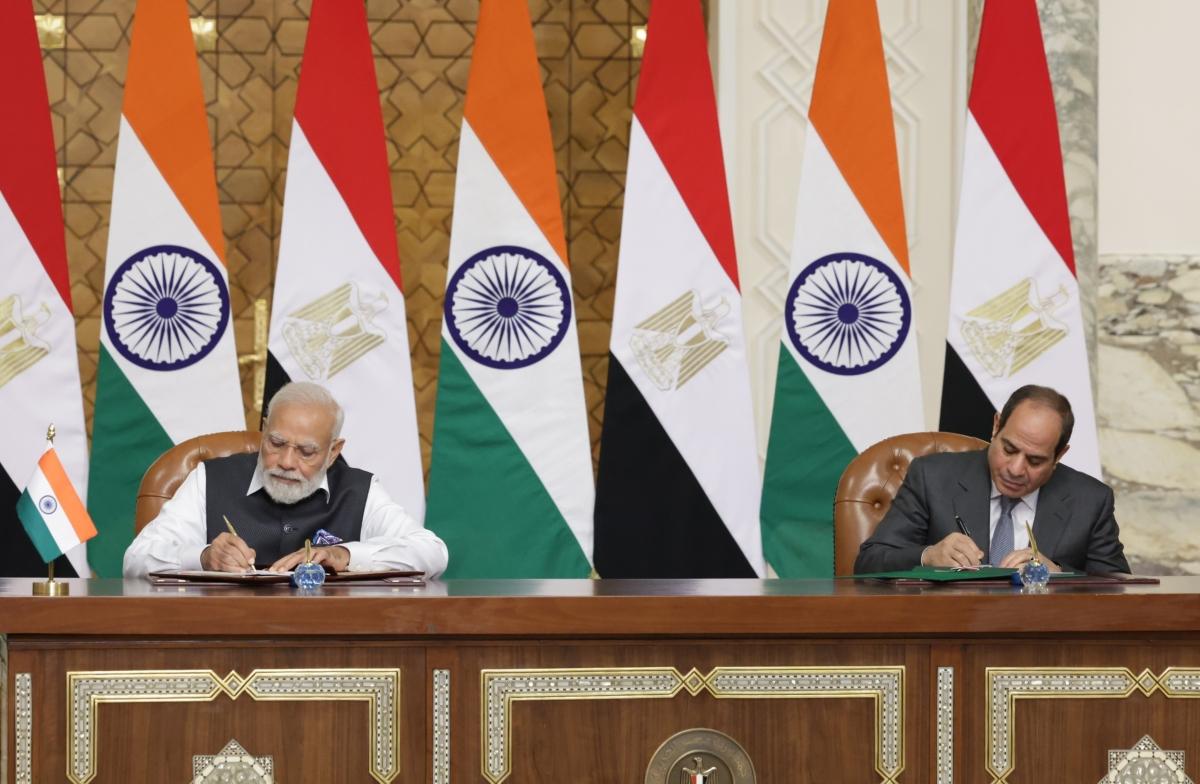A Grand Revival: Strengthening India-Egypt Ties
Context:
The recent decision by India and Egypt to upgrade their bilateral ties to a Strategic Partnership during the meeting between Prime Minister Narendra Modi and Egypt President Abdel Fattah El-Sisi marks a significant milestone in India’s relations with the West Asia-North Africa (WANA) region.
Relevance:
GS-02 (International treaties and agreements) (Groupings and agreements involving India and/ or affecting India’s interest)
Prelims:
- Non alignment movement (NAM)
- Organization of Islamic cooperation (OIC)
Mains Questions:
- Discuss the recent developments in India-Egypt relations, highlighting the areas of cooperation and their impact on regional dynamics. (250 words)
Background:
- The historical connections between the two nations have paved the way for this long-overdue collaboration. Having signed a Friendship Treaty in 1955, India’s unwavering support to Egypt during the Suez Canal crisis in 1956 played a crucial role in the formation of the Non-Aligned Movement in 1961, with both countries as its founding members.
- They have been instrumental in fostering the G-77 grouping and promoting initiatives of “South-South Cooperation.” Throughout the Cold War era, India and Egypt shared a common stance of not aligning themselves with either the United States or the Soviet Union.
- More recently, their positions regarding the Ukraine conflict have showcased remarkable similarity, as they refrained from criticizing Russia’s actions while advocating for a diplomatic resolution.
- Prime Minister Modi’s visit to the Al-Hakim Mosque and his meeting with Egypt’s Grand Mufti demonstrate an earnest effort to dispel any apprehensions surrounding his government’s policies towards the Muslim world.
Dimensions of the article:
- Historical Significance of India-Egypt Friendship Treaty:
- Recent Developments and Areas of Cooperation
- Impact on Regional Dynamics:
Historical Significance of India-Egypt Friendship Treaty:
- The India-Egypt Friendship Treaty, inked in 1955, holds immense historical significance. This bilateral agreement not only laid the foundation for a strong diplomatic bond but also served as a catalyst in shaping the Non-Aligned Movement.
- By extending support to Egypt during the Suez Canal crisis in 1956, India displayed its commitment to non-alignment and refusal to align with the superpowers of the era, the United States and the Soviet Union.
- This shared stance resonated with Egypt’s aspirations for autonomy and independence, leading to the consolidation of their partnership.
- Together, India and Egypt played pivotal roles in advocating for the principles of non-alignment, promoting multilateralism, and safeguarding the interests of the Global South.
Recent Developments and Areas of Cooperation:
- In recent years, India and Egypt have witnessed a significant upswing in their bilateral relations, paving the way for enhanced cooperation across various sectors.
- The mutual decision to upgrade their ties to a Strategic Partnership reflects the commitment of both nations to forge a deeper and more comprehensive engagement.
- The wheat supply provided by India to Egypt during a critical period of export restrictions showcased India’s goodwill and solidarity. This act of assistance not only bolstered Egypt’s food security but also garnered appreciation and strengthened the bilateral relationship.
- Additionally, both countries are actively exploring avenues for cooperation in green energy, pharmaceuticals, and defense. The signing of MoUs in areas such as agriculture, archaeology, antiquities, and competition law demonstrates the diverse range of fields where collaboration is being fostered.
Impact on Regional Dynamics:
- The growing closeness between India and Egypt holds significant implications for the regional dynamics of the WANA region.
- As India strengthens its ties with Egypt, it simultaneously deepens its connections with the wider neighborhood, including Israel and Saudi Arabia. This multifaceted engagement enables India to play a more constructive role in addressing regional challenges and fostering stability. Furthermore, the synergy between India and Egypt in areas such as food and energy security, multilateralism, and cooperation with the Global South, including the African Union, expands the scope of their collective influence.
- Egypt’s recent participation in the “New Development Bank” established by BRICS signifies its desire to join this influential grouping. Seeking India’s support in this endeavor highlights the trust and cooperation that exists between the two nations.
- By aligning themselves with each other, India and Egypt are effectively shaping the future of their economies and pursuing autonomous foreign policies.
Way Forward:
- To sustain and further strengthen the India-Egypt Strategic Partnership, it is imperative to focus on several key aspects. First and foremost, regular high-level visits and engagements should continue to foster political dialogue and reinforce the foundation of trust and cooperation.
- Second, identifying and prioritizing specific areas of collaboration, such as technology transfer, research and development, and skill exchange, will drive economic cooperation between the two nations.
- Third, people-to-people exchanges, cultural initiatives, and academic collaborations should be encouraged to deepen mutual understanding and forge lasting bonds at the grassroots level.
- Finally, leveraging the strategic location of both countries, efforts should be made to enhance connectivity, particularly in the areas of trade, tourism, and logistics, to unlock the untapped potential and facilitate greater engagement.
Conclusion:
The recent decision to elevate India-Egypt relations to a Strategic Partnership heralds a new chapter in their historical association. The enduring friendship and shared vision of non-alignment have paved the way for a comprehensive collaboration between the two nations. By capitalizing on their historical ties and navigating the complexities of the contemporary geopolitical landscape, India and Egypt are embarking on a path that encompasses not only economic prosperity but also autonomous foreign policies. The grand revival of India-Egypt relations holds immense potential to shape the dynamics of the WANA region, promote regional stability, and contribute to the collective progress of the Global South.





